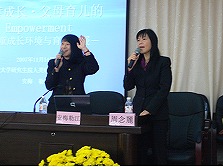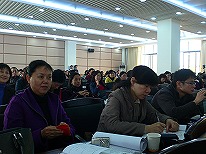On November 12, 2007, the East Asia Child Science Research Program, hosted by CRN and East China Normal University, held a splendid opening ceremony at the East Asia Child Science Exchange Program in Shanghai.
Dr. Jiaxiong Zhu, East China Nomal University and Dr. Noboru Kobayashi,
Director, CRN shake hands after signing the agreement.
The Child Science Research Program in East Asia aims to expand Child Science in this region through reciprocal lectures given by leading specialists in child rearing, child care, and early childhood education. This program will be held on an ongoing basis as a way of bringing East Asian countries together to grapple with the problems of children today.
Beginning the following day and extending over a period of two days at Changsha Normal College in China, it was a truly memorable event. Four experts in their respective fields attended from Japan: Dr. Noboru Kobayashi, Director, CRN, and Professor Emeritus, University of Tokyo; Mr. Chihiro Tada, Director, Art Education Institute; Dr. Tokie Anme, University of Tsukuba; and Dr. Yoichi Sakakihara, Ochanomizu University. This made for a lively exchange.
In his lecture on the first day, Dr. Kobayashi noted the importance of putting to work the program of emotions in children to enable them to experience the joy of living. To do this, it is necessary to reconsider the methods of child rearing, child care, and early childhood education from an interdisciplinary perspective that includes, for example, brain science, psychology, education, pediatrics, and child ecology. Participants in the program voiced support for the principles of Child Science and its viewpoint that brings together various fields to bridge the science and the humanities.
This was followed by Mr. Chihiro Tada's presentation on the "capacity for play." Due to the increasing popularity of high-tech toys, Japanese children experience both decreasing communication and friction in peer relationships and less interaction with the elderly. Together, this indicates a rupture in the generational transmission of the culture of play and a decline in the capacity for play. A demonstration included audience participants to show how playing with toys can restore the lost capacity for play, and this was particularly well-received.
The following day, Dr. Tokie Anme gave a lecture on child raising and child-raising empowerment. "Empowerment" refers to the maximizing of a person's inherent capacities and abilities to their fullest and most vital expression. The lecture was accompanied by an explanation and demonstration of methods that, in the case of child raising, empower both the child and caregiver. The audience was very moved by this approach and asked many questions on how it could be applied to the particular child raising environment in China.

Lecture by Dr. Tokie Anme, University of Tsukuba

Taking notes at lectures with high interest
Dr. Yoichi Sakakihara's lecture on "Emotional Development and Disorders in Children" explained the nature of developmental disorders, which occur when the development of emotions in young children and that of their inherently superior capacity for learning becomes problematic. The participants engaged in early childhood education actively sought advice on how to deal with such children.
The first Child Science Research Program in East Asia was a great success. All four lectures were filled to capacity with participants who had come from all over China. After each session, there were so many questions that not all could be answered. It also showed that many of the problems of children transcend differences in educational systems and are quite similar in each country. There is high interest in how other countries are tackling problems and a desire to absorb what might be beneficial and useful. The success of the program gives us all high motivation to continue such efforts into the future.
Dr. Jiaxiong Zhu, East China Nomal University and Dr. Noboru Kobayashi,
Director, CRN shake hands after signing the agreement.
The Child Science Research Program in East Asia aims to expand Child Science in this region through reciprocal lectures given by leading specialists in child rearing, child care, and early childhood education. This program will be held on an ongoing basis as a way of bringing East Asian countries together to grapple with the problems of children today.
Beginning the following day and extending over a period of two days at Changsha Normal College in China, it was a truly memorable event. Four experts in their respective fields attended from Japan: Dr. Noboru Kobayashi, Director, CRN, and Professor Emeritus, University of Tokyo; Mr. Chihiro Tada, Director, Art Education Institute; Dr. Tokie Anme, University of Tsukuba; and Dr. Yoichi Sakakihara, Ochanomizu University. This made for a lively exchange.
In his lecture on the first day, Dr. Kobayashi noted the importance of putting to work the program of emotions in children to enable them to experience the joy of living. To do this, it is necessary to reconsider the methods of child rearing, child care, and early childhood education from an interdisciplinary perspective that includes, for example, brain science, psychology, education, pediatrics, and child ecology. Participants in the program voiced support for the principles of Child Science and its viewpoint that brings together various fields to bridge the science and the humanities.
This was followed by Mr. Chihiro Tada's presentation on the "capacity for play." Due to the increasing popularity of high-tech toys, Japanese children experience both decreasing communication and friction in peer relationships and less interaction with the elderly. Together, this indicates a rupture in the generational transmission of the culture of play and a decline in the capacity for play. A demonstration included audience participants to show how playing with toys can restore the lost capacity for play, and this was particularly well-received.
The following day, Dr. Tokie Anme gave a lecture on child raising and child-raising empowerment. "Empowerment" refers to the maximizing of a person's inherent capacities and abilities to their fullest and most vital expression. The lecture was accompanied by an explanation and demonstration of methods that, in the case of child raising, empower both the child and caregiver. The audience was very moved by this approach and asked many questions on how it could be applied to the particular child raising environment in China.

Lecture by Dr. Tokie Anme, University of Tsukuba

Taking notes at lectures with high interest
Dr. Yoichi Sakakihara's lecture on "Emotional Development and Disorders in Children" explained the nature of developmental disorders, which occur when the development of emotions in young children and that of their inherently superior capacity for learning becomes problematic. The participants engaged in early childhood education actively sought advice on how to deal with such children.
The first Child Science Research Program in East Asia was a great success. All four lectures were filled to capacity with participants who had come from all over China. After each session, there were so many questions that not all could be answered. It also showed that many of the problems of children transcend differences in educational systems and are quite similar in each country. There is high interest in how other countries are tackling problems and a desire to absorb what might be beneficial and useful. The success of the program gives us all high motivation to continue such efforts into the future.














